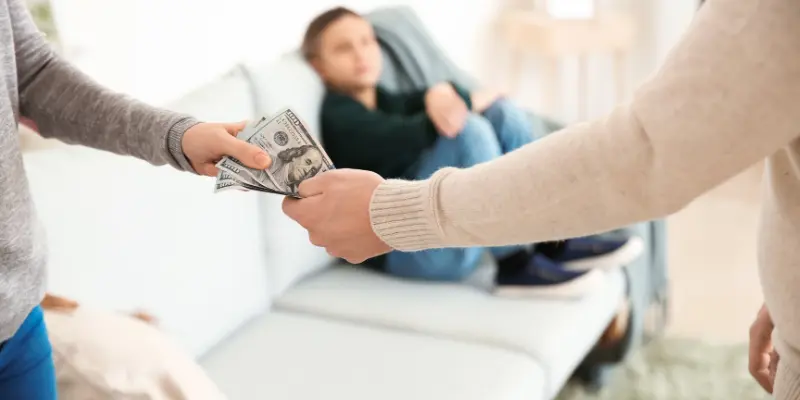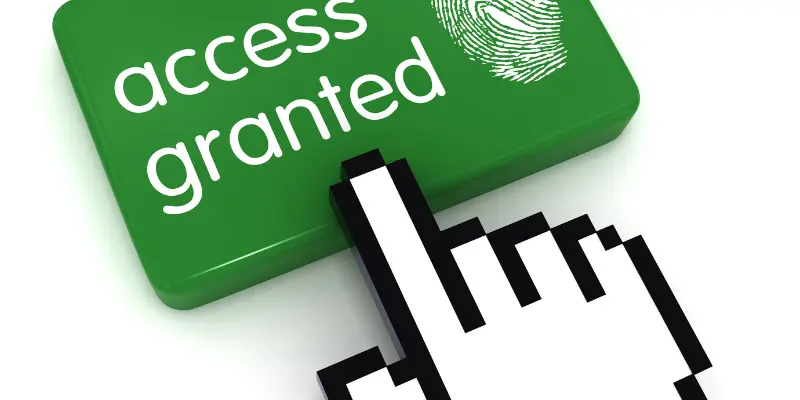Getting your life back on track after prison is tough, and former felons often face starting over from scratch. No place to live. No job. No transportation. If you’ve been searching for free money for released inmates, or wondering if you can get any financial help at all, here’s everything you need to know.
Do Grants For Ex Felons Exist in 2026?

Yes, grants for ex felons exist, but you won’t be able to go to the government grant database and apply for a grant just because you’ve got a felony conviction. The system doesn’t work that way.
It’s a myth that felons can get special grants that put cash in their pockets. Keep away from scam websites offering second chance grants for felons and charging fees to join their programs.
Grant money for released prisoners is awarded to organizations that help felons. To benefit from that grant money, you need to join a reentry program.
How Do Reentry Programs Help Felons?
The services available through reentry programs depend on the provider. The best funded providers offer residential reentry programs with comprehensive support for former felons; a place to live, meals, clothing, job training, job placement support, and help to find long-term housing.
This kind of help is worth tens of thousands of dollars and is far more valuable than a simple cash grant could ever be.
Other providers only help with things like obtaining ID and getting a job. While they don’t offer housing, they can connect you with long stay shelters, rooming houses that rent to felons, or transitional housing so you’ve got a safe place to live while you work through the program.
Some reentry programs offer small second chance grants for felons making good progress toward their goals. These free grants for felons are issued for move in costs like security and utility deposits, the cost of training for something like a commercial driver’s license, or to pay for tools and equipment necessary for work.
Finding A Reentry Program
If you’re a recently released felon, joining a reentry program is the best move you can make. Instead of struggling on your own, you get professional help from a network with the resources and connections to get you back on your feet.
To find reentry programs in your area, call the free 2-1-1 helpline and ask for details about local providers.
Free Money For Ex Felons: Legitimate Assistance From The Government
Instead of searching for free money for ex-felons, focus on the free money you can qualify for from regular government assistance programs. Government agencies distribute free money via various benefit programs and, like anyone else on a low income, felons can apply for and receive:
- Free money to buy food
- Cash assistance to support minor children
- Money to pay utility bills
- Rent assistance
- Free phone service
- Free or low cost health insurance
- Financial support to go to college or trade school
How Felons Can Get Free Money To Buy Food
One of the main free grants for felons is the Supplemental Nutrition Assistance program (SNAP) which issues a monthly payment to low-income individuals and families.
This money can only be used to buy food. You can’t use SNAP to buy household supplies, hygiene products, pet food, alcohol, or tobacco.
Having a felony won’t affect your eligibility for SNAP. As long as your income and qualifying assets are below the program limits in your state, you will qualify. The amount you receive depends on your income, household size, and state.
In Illinois, for example, an individual making less than $2070/month can receive a maximum payment of $292/month. A family of 3 can qualify with an income under $3,550/month and receive a maximum of $768/month.
Use a SNAP calculator to estimate your benefit: https://www.snapscreener.com/
Temporary Assistance For Needy Families (TANF) Provides Cash Grants
TANF is the cash assistance program for very low income families with children. Unlike SNAP which can only be used for food, TANF can be used for a much wider range of expenses.
Can felons get TANF? Yes, if you’re responsible for a child under the age of 18 who lives with you, and you meet the income limits, you can qualify. The income limits and payment are very low, though.
In Colorado, for example, the countable income limit is $421/month for a family of 3, and their maximum cash grant would be $592/month.
In addition to monthly cash grants, TANF programs also provide job training and child care assistance.
Learn more and apply: https://www.usa.gov/welfare-benefits
LIHEAP Helps Low Income Households Pay For Energy
More free money for ex-felons comes from LIHEAP. The Low Income Home Energy Assistance Program can help you pay your utility bills. LIHEAP issues 2 types of grants.
Regular grants: These grants make a payment directly to your energy provider and cover a portion of your energy expenses for heating (and cooling in some states).
Crisis grants: These grants are for households facing a utility shut off after receiving a notice from their energy supplier. Crisis grants can also pay for the repair of a broken heating system or for heating fuel like kerosene, propane or firewood if you’re about to run out.
Each state runs their own version of LIHEAP. Eligibility and payment amounts vary depending on household size, income, and the state.
New Jersey residents can qualify for heating and cooling grants with each one worth up to $1,278/year. An $800 winter crisis grant is also available.
Find your state LIHEAP agency: https://www.liheap.org/
What Kind Of Rent Assistance Grants Can Felons Get?

Felons can get rent assistance through Public Housing Agencies and Rapid Rehousing Programs. Rapid Rehousing is for homeless individuals and families. Public Housing programs are for anyone that meets the income limits and other background criteria.
Rapid Rehousing Programs
RRH operates on a housing first model. This means that access to safe, stable housing is the top priority. Your felony won’t count against you, and you don’t need to be sober.
Initial housing may be at a shelter or motel, but your case manager will work with you to secure long-term housing. RRH pays for move in costs like security deposits, and many programs also pay rent for several months.
To access RRH, you need a referral. Contact your Community Action Agency, or Coordinated Entry System access point to get started, or call the free 2-1-1 helpline for details.
Public Housing Agencies
Rent assistance via PHA programs is the one government benefit where your felony could be an issue. All PHA’s have their own eligibility criteria, and the PHA in your city could have fairly tight restrictions, while another city in your state could be more flexible.
PHA’s can’t use blanket bans that disqualify all felons. Disqualifications for criminal history must be justified by safety concerns after an individual assessment has taken place.
The only crimes that will always result in denial for rent assistance are:
- Manufacturing methamphetamine on the premises of federally assisted housing
- Sex offenses requiring lifetime registration on a state sex offender registry
Other felonies may be approved after a specific period. A drug offense may no longer be a barrier after 12 months, for example, while a violent offense could make you ineligible for 5 years or more. It all depends on the rules at your PHA.
How Much Is Rent Assistance?
Felons can apply for Public Housing which is owned by the government, and the Housing Choice Voucher program, which helps cover rent in private rentals.
In both cases, the amount of money you have to pay towards your rent is capped at 30% of your income. If you earn $1,000/month, you pay a maximum of $300 toward your rent. If you make $3,000/month, you pay $900.
Rent assistance is worth thousands of dollars per year, making the program one of the most valuable free grants for felons. Demand for assistance is very high, though, and places on the program are limited.
All PHA’s operate waiting lists. That means that even if your income and criminal background qualify for the program, you could have to wait for months or even several years before you start getting rent assistance.
Emergency rent assistance vouchers may be available if you’re homeless, or disabled.
See Also: Grants For Ex Felons To Purchase A Home
Applying For Rent Assistance
Most PHA’s only run a background check when you get to the top of the waiting list, and many felons find that by the time they get to the top of the list, their offense is no longer a barrier.
To check your PHA criminal background policy and apply for rent assistance, visit your local office or PHA website.
Find your PHA contact details: https://www.hud.gov/contactus/public-housing-contacts
Low-Income Felons Can Get Free Cell Phone Service
The government’s Lifeline program funds basic phone service for low-income households. The program operates through telecom providers, so you need to find a provider offering the program in your state.
Program providers offer different benefits, but at a minimum they must provide 1000 minutes per month and 4.5GB of data. Many actually offer unlimited minutes for calls and texts and higher data limits.
Who qualifies for free cell phone service? Anyone already receiving government benefits like SNAP, TANF, Medicaid, or Housing Assistance, will automatically qualify. Otherwise, eligibility is based on income.
In most states, the income limit for a single person is $1,760/month, while a family of 3 can qualify with income up to $2,998/month. Larger households have higher limits.
The phone service program is a fairly small amount of free money for ex felons, but when you’re on a low income even small amounts matter, so if your income qualifies, make sure you apply.
Find a provider: https://www.lifelinesupport.org/companies-near-me/
Free Health Insurance For Felons
Free health insurance is another benefit felons on low incomes can qualify for. All states run a version of the Medicaid program, which offers free or low-cost insurance to those unable to afford other options.
Medicaid covers routine and emergency medical care at in-service providers. That means the provider you use must accept Medicare, or you’ll get a bill.
Medical insurance is a big expense, costing hundreds of dollars a month for most people, so getting free cover is a really valuable benefit, especially for felons with ongoing medical needs like prescriptions, or dialysis.
As a felon, you’re eligible to enroll in Medicaid as soon as you’re released from prison. You’ll need your ID and other documents to apply.
Get Medicaid: https://www.medicaid.gov/about-us/where-can-people-get-help-medicaid-chip
If you don’t meet the eligibility criteria for Medicaid in your state, or need care while your application is pending, you can still get free and sliding scale medical care at free and affordable cost clinics.
Find a clinic: https://nafcclinics.org/find-clinic/
Free Grants For Felons To Go to College Or Trade School
Getting a college degree or vocational certification can change your life, but education comes with a big price tag. Fortunately, substantial grants are available for students on low incomes.
Even if you aren’t interested in a college degree, going to school for a trade certification is an option worth considering. Trade schools run a wide range of programs to jump start your career, covering everything from Culinary Arts to Welding.
So what kind of grants can felons get to help cover the cost of going back to school?
Pell Grants
The Federal Pell Grant is worth up to $7,395 per year. Eligibility is based on financial need. Your income, household size, and cost of attending school are used to determine your eligibility and grant amount. To apply, fill out the Free Application for Federal Student Aid (FAFSA).
Learn more: https://studentaid.gov/understand-aid/types/grants/pell
FSEOG
The Federal Supplemental Educational Opportunity Grant is for students on very low incomes. It’s worth up to $4,000 per year. However, funding for this grant is limited and grants are issued on a first come, first served basis. Apply early to stand the best chance of getting this grant.
Learn more: https://scholarships360.org/financial-aid/seog-grants-eligibility-amounts/
State Grants
Federal grants aren’t the only grants available to you. Your state will also offer grants to help you pay for school. Some state programs are very generous, covering all the remaining costs after your federal grants have been applied. Other states offer grants with fixed upper limits.
To find out what grants are available in your state, go to your state’s education website.
Workforce Innovation and Opportunity Act Grants
The WIOA funds education and training for jobseekers with barriers to employment. As a felon, you can access programs funded by this grant through your local Work Force office or American Job Center.
You’ll get a skills assessment and advice on which career path would be the right fit for you. From there, your advisor will match you with training programs and get you set up.
Individual grants may also be provided to help cover initial employment costs like uniforms and tools. Financial support can also help pay for transportation and childcare costs while you train.
Learn more: https://www.careeronestop.org/

Meet the driving force behind FelonAssistance.org, Wolf Matt. With a computer engineering degree, who specialize in societal impact